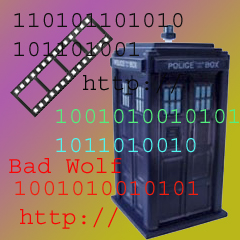A magazine where the digital world meets the real world.
On the web
- Home
- Browse by date
- Browse by topic
- Enter the maze
- Follow our blog
- Follow us on Twitter
- Resources for teachers
- Subscribe
In print
What is cs4fn?
- About us
- Contact us
- Partners
- Privacy and cookies
- Copyright and contributions
- Links to other fun sites
- Complete our questionnaire, give us feedback
Search:
Bad Wolf...or a virus in your head?
Lights, cameras, web page
Back in the summer of 2001, the Steven Spielberg film AI: Artificial Intelligence was released. Along with the standard film trailers on the web came rumours about someone named Jeanine Salla. If you searched for the name you found a web page for a university scientist working on advanced robotics and artificial intelligence, it all looked very convincing: lists of scientific papers, a CV, and a full website for Bangalore World University. This was just the start, you could continue the trail and find other sites, drawing you into a world of robotic revolution. But the revolution wasn't about robots. The sites were fakes. The real revolution was the emergence of viral marketing as a tool for marketing movies.
The birth of Viral Marketing

Viral marketing is a different way to raise awareness of your film or TV show. You don't shove it forward using the usual posters or TV campaign. Instead you create a new online reality, and wait; someone will find it, and then they tell their friends, and their friends tell others. They post on bulletin boards and eventually you create an enormous buzz on the internet. The low budget horror film the Blair Witch project showed for the first time what a cost effective and powerful marketing strategy having a fictional web presence was. It was only a matter of time before this marketing method became mainstream. The fictional sites look as real as anything else on the web; there are layers of secrets and details, hidden text, web sites that look as if they have been 'hacked', with messages hidden in the source code of the web pages. These virtual worlds have the power to draw you in.
BBC's Bad Wolf
A recent example of good viral marketing is in the 2005 BBC TV series Dr Who, where clues on the mystery surrounding the identity of the 'Bad Wolf' were laid out across a number of fictional sites like www.badwolf.org.uk. There were fake sites that were actually referred to in the series (www.whoisdoctorwho.co.uk), a fake site for the UNIT group (www.unit.org.uk) and for the fictional company Geocomtex which appeared in the show www.geocomtex.net. These sites were not publicised in the early stages. There presence exploded onto the Internet as fans traded information. The viral marketing helped make the TV series a resounding success, and added a whole new dimension of depth to the series.
A step too far?
In 2001 Electronic Arts released an innovative new game called Majestic. The conspiracy-based game invaded your life and couldn't be switched off; you give it your phone number, fax number and e-mail address. Strange faxes arrive, odd phone calls occurred at strange times and mysterious emails arrived. The line between game and reality blurred, as the designers made use of all the electronic forms of communication available to make the game play real. Surprisingly however the game was not a success. In fact it was shut down half way through costing the company many millions of pounds. The game players of the world weren't ready for that level of immersive reality just yet.
Beyond the web

But there are still games around that are played by mixing fantasy with reality. For example Uncle Roy is a game that links online players worldwide with players on the real streets of the city, who, using mobile computers search for the mysterious Uncle Roy. This type of entertainment is set to continue and expand as new technologies become available to give us new ways to communicate and play.
The future
The creative use of computers and the web in marketing films and television series through the creation of alternative realities will continue, and who knows where it will end. Perhaps in the not too distant future the immersive reality that Majestic pioneered may join up with the alternative realities created for viral marketing; a get together which could prove quite a show.
How will the 2006 Dr Who series be viral marketed?
Stop Press: The new series is coming - and its started already...The Cybermen are back!More on the Movies
Spotted any computer science movie bugs?The Maze

Out of the door of a police box a crowd roars for blood

The door closes, a mobile phone rings.


